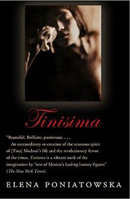

Harper Perennial, paperback, 9780061731303
Some lives are so remarkable that they can only exist as myths, the truth lost in the haze of publicity. One such life belonged to Tina Modotti. An Italian born into poverty, she eventually became the muse of, then a leading figure in, the burgeoning bohemian arts scene in Mexico in the 1920s. Artistic aesthetics were eventually replaced by left-wing activism, and Modotti journeyed to Moscow to work as a secret agent of the Soviets, before making her way to Spain to participate in the horrific civil war there. She returned to Mexico to die a suspicious death in the back of a taxi.
The bare facts of Modotti's life are known, but she remains an elusive figure. Some historians depict her as a dangerous femme fatale, assassin and Soviet lackey, even claiming that her photography, for which she won international acclaim, was largely the work of her lover Edward Weston. Elena Poniatowska's novel creates a new, more sympathetic myth of a remarkable woman. Her Modotti is a beautiful soul whose art exists for the sake of beauty, whose sexual activity exists for the sake of her heart, and whose activism exists for the sake of other people. Poniatowska is not naïve in her depiction of Modotti. Her promiscuity, her love affair with Stalinism, her work for the Soviets, and her relationship with Vittorio Vidale—grey eminence of international communism and sometime assassin—are all laid bare for the reader. What are also laid bare, however, are Modotti's heart and soul, and what emerges is a truly beautiful and passionate novel.
Poniatowska allows us to understand what history has chosen to condemn. Under her skilful hand Modotti becomes
someone driven by her passions, not her calculations. The relatively simple language used by Poniatowska
lends an air of honesty to Modotti, making her seem simultaneously simple in her motives and complex in her
motivations. The biggest endorsement I can give this wonderful book is to say that I was a little bit in love
with Tina Modotti by the end, and was genuinely upset watching her fade away as her communist dreams slowly
died, defeated in Spain and trampled by the Hitler-Stalin pact. No one will ever be able to say which Tina Modotti
myth is closer to the truth, the scheming femme fatale or Poniatowska's passionate soul, but I know I prefer
to believe in the latter. It is a more beautiful view of humanity, and formed the centrepiece of a very beautiful
book.
Read more about Elena Poniatowska in this Wikipedia article.
